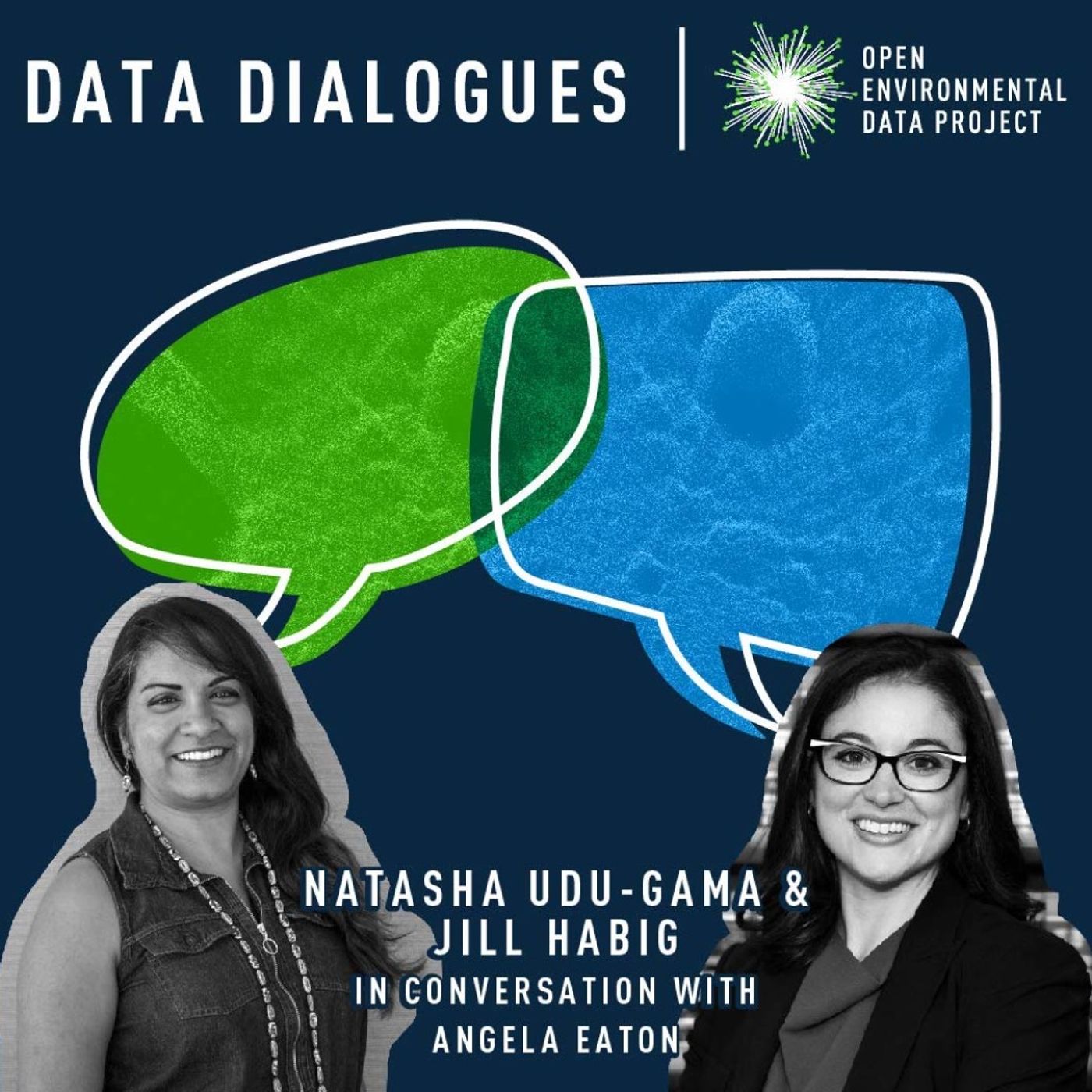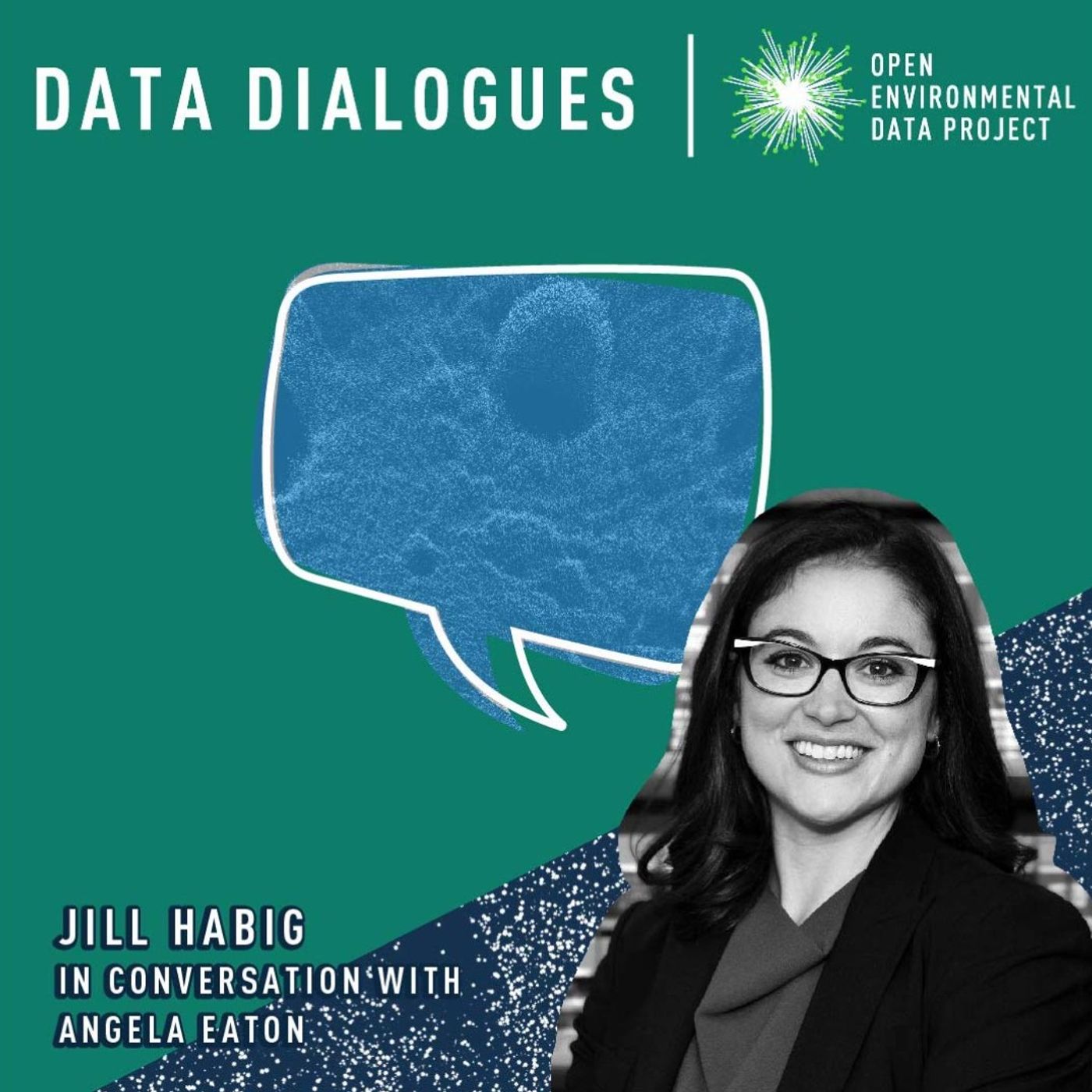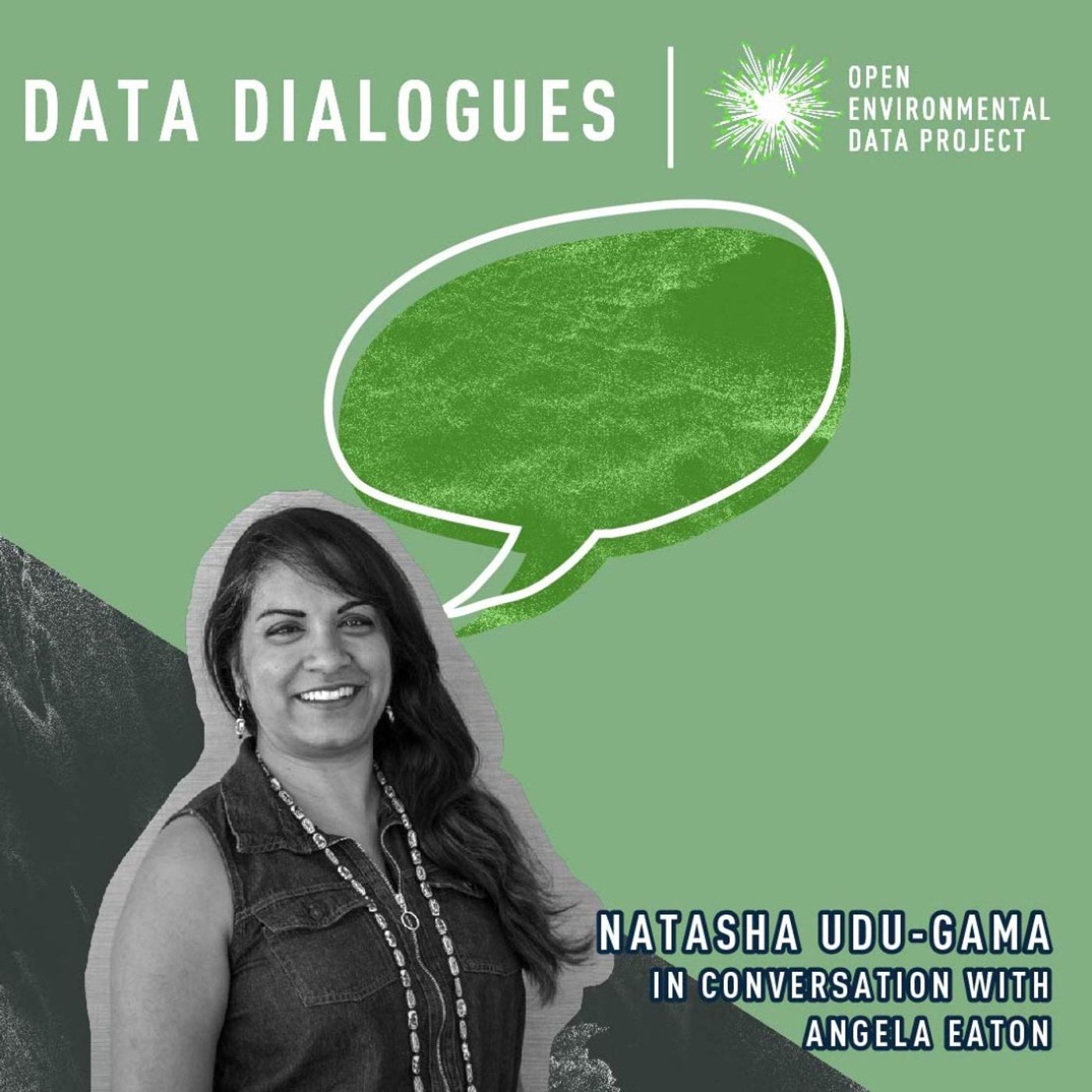Discover Data Dialogues
Data Dialogues

Data Dialogues
Author: Michelle Cheripka, Open Environmental Data Project, Madhuri Karak
Subscribed: 3Played: 4Subscribe
Share
© CC-BY-SA Open Environmental Data Project
Description
The Data Dialogues podcast brings together multiple perspectives to look at a single environmental data issue.
Created by Open Environmental Data Project (OEDP), where we are building spaces to grow the global conversation on environmental data access and use.
Created by Open Environmental Data Project (OEDP), where we are building spaces to grow the global conversation on environmental data access and use.
35 Episodes
Reverse
In this bonus episode for Season 3, Madhuri Karak speaks with Michelle Thorne (Green Web Foundation) and Shannon Dosemagen (Open Environmental Data Project), two co-founders of Open Climate. Together, they delve into curated collision, a knowledge commons for climate information, and the importance of open for climate action.
In this episode, we look into the painstaking compilation of data previously inaccessible and scattered between different government agencies, that is finally shedding light on an extractive industry with massive environmental climate and livelihood consequences: sand mining. In this episode, Madhuri Karak speaks with Siddharth Agarwal about India Sand Watch, an environmental accountability project with an open data platform at its heart.
We need to burn fewer and fewer fossil fuels to keep greenhouse gas emissions low and ensure the 1.5 degrees Celsius threshold isn't breached. But can we manage and reduce something that we didn't measure accurately in the first place? National governments signed the Paris agreement to limit global warming and cut emissions, but the data on fossil fuels—how much there is, how much was burned, and how much of it is in reserve—all of that information comes from... fossil fuel companies. In this episode, Madhuri Karak speaks with Johnny West, an architect of the Global Registry of Fossil Fuels, who is trying to change that.
Los datos son una pieza clave para que las comunidades puedan reclamar sus derechos y recursos, y la ausencia de datos puede dificultar ese proceso. En este episodio, la presentadora Madhuri Karak habla con José Luis Rengifo, director del Proceso de Comunidades Negras (PCN) y Omaira Bolaños, directora de los Programas de América Latina y Justicia de Género de la Iniciativa de Derechos y Recursos (RRI). José Luis y Omaira son dos representantes de una coalición que lleva décadas trabajando en pos de los derechos territoriales de las comunidades afrodescendientes en el Caribe y América Latina.
Data is a key piece of how communities make claims on rights and resources—and the absence of data can make that claims making process difficult. In this episode, host Madhuri Karak speaks with Jose Luis Rengifo, the director of the Process of Black Communities (PCN) and Omaira Bolaños, the director of the Latin America and Gender Justice Programs at Rights and Resources Initiative (RRI). Jose Luis and Omaira are two representatives of a decades-long coalition effort seeking territorial rights for Afro-descendant communities across the Caribbean and Latin America.
What does it mean to take back knowledge and data about our environments, from the hands of those who monopolize this knowledge for centuries, and use that knowledge to extract value from land and people alike? In this episode, Madhuri Karak speaks with Scott Eustis, the community science director at Healthy Gulf, about what taking back ownership of knowledge and data about our landscapes, our bodies, looks like in the Gulf Coast of the US.
OpenAQ: https://openaq.org/#/OpenAQ Explorer: https://explore.openaq.org/Predicting What We Breathe: https://airquality.lacity.gov/World Health Organization Ambient Air Quality and Health fact sheet: https://www.who.int/news-room/fact-sheets/detail/ambient-(outdoor)-air-quality-and-health
Climate information exists in a lot of different formats: there are reports, datasets, peer reviewed research articles, blogs, videos, and more. If we're going to have a real shot at tackling the climate crisis, then the knowledge we've produced about climate change needs to be open—but how do we give permission while protecting creators from harm?. In this episode, Madhuri Karak speaks with Monica Granados, who leads the Open Climate campaign at Creative Commons, about the role of licenses in building climate resilience.
The latest UN IPCC report (AR6) runs... 30,000 pages. For those of us who don't have the time to read this in full, how do we incorporate the golden standard of climate science into our own work? In this episode, Madhuri speaks with Shweata Hegde, a developer at #semanticClimate, who is building a tool that will break AR6 down and turn it into an accessible resource.
When we first start learning about something, Wikipedia is often our first stop. But where does Wikipedia fit in when it comes to climate change - a complex, multi-dimensional, and urgent topic like no other? In this episode, Madhuri speaks with Evelin Heidel, the Program Director of Wikimedistas de Uruguay about how Wikipedia lays the groundwork for our understanding of climate change.
Season 3 of Data Dialogues features interviews with different folks working at the intersection of the open and climate movements. In the trailer, host Madhuri Karak outlines what you can expect from this season's guests.
In our last episode, we get into what happens when mapping is stuck in bureaucratic limbo. In order to document harm from rampant resource extraction and loss of livelihoods, communities are turning to monitoring their environments. You’ll hear from lawyer Andiko Mancayo, policy expert Anne-Sophie Gindroz, and several others you’ll recognize from earlier in the season.
In this episode, you’ll meet anthropologist Sophie Chao and a few others you’ve already encountered earlier in the season - social scientist Micah Fisher, political ecologist Irendra Radjawali and scholar Rini Astuti. We discuss the limitations of modern cartography and what we miss when we privilege the visual above all other perspectives.
In this episode, you’ll hear indigenous leader Effendi Buhing from the village of Kinipan in Central Kalimantan, our interpreter Ayu Septiari who translated between Indonesian Bahasa and English, and we talk about Kinipan’s ongoing fight to save its land and forest from the palm oil company PT. Sawit Mandari Lestari, or PT-SML.
In Episode 3, Madhuri speaks with Jaringan Kerja Pemetaan Partisipatif, or the Indonesian Community Mapping Network’s Imam Hanafi, Muhammad Husen, and Imam Masud, and the former secretary of Indonesia's Indigenous Peoples Alliance, Abdon Nababan.
In this episode, you’ll hear from some folks you met in episode 1: journalist Bagja Hidayat, social scientist Micah Fisher, policy advocate Anne-Sophie Gindroz. Two new voices include political ecologist Irendra Radjawali and scholar Rini Astuti. Together with Madhuri, they dig deeper into the post-Suharto era in Indonesia, and the political conjuncture that created the perfect set of conditions for OneMap to emerge.
In this epsiode, Madhuri traces the global origins of OneMap and why institutions across the board, from corporate actors to civil society organizations, thought a map could usher in a new era of land governance in Indonesia. You’ll hear from journalist Bagja Hidayat, policy researcher Myrna Safitry, social scientist Micah Fisher, policy advocate Anne-Sophie Gindroz, and sustainability expert Gita Syahrani.
What does it take for scientists and lawyers to really work with communities - and how does it change them? In the final episode of Season 1, Angela talks with Natasha Udu-gama and Jill Habig about how they set up the conditions for community relationships, making the case for personal transformation and culture change in government, academia, and the law.In Data Dialogues, we highlight two people working with environmental data and then bring them in conversation with each other. Listen to this conversation on its own or pair it with Natasha Udu-gama's conversation in Episode 16 and Jill Habig's conversation in Episode 17.You can access a transcript of this episode and Show Notes on our website and join in the conversation on Twitter @OpenEnviroData and Instagram @OpenEnviroData! Natasha Udu-gama (she/her) is the Community and International Relations Manager at Thriving Earth Exchange, an organization that brings together local leaders and scientists to create community based environmental solutions.Jill Habig (she/her) founded Public Rights Project, a non-profit working with communities and all levels of government to proactively support civil rights.Angela Eaton (she/her) is the Director of Data Inclusion at Open Environmental Data and host of Data Dialogues.
Community members should not have to be "extraordinary" to access their rights. Jill Habig, founder of Public Rights Project, uses the law to change economic and environmental systems that allow only extraordinary individuals to defy them. In this episode, she shares ways that she's found local governments, by listening just a little differently, have strengthened their bonds with communities and protected the environment.In Data Dialogues, we highlight two people working with environmental data and then bring them in conversation with each other. Listen to this conversation on its own or pair it with Natasha Udu-gama's conversation in Episode 16 and Natasha and Jill's dialogue in Episode 18. You can access a transcript of this episode and Show Notes on our website and join in the conversation on Twitter @OpenEnviroData and Instagram @OpenEnviroData! Jill Habig (she/her) founded Public Rights Project, a non-profit working with communities and all levels of government to proactively support civil rights.Angela Eaton (she/her) is the Director of Data Inclusion at Open Environmental Data and host of Data Dialogues.
Natasha Udu-gama, of AGU's Thriving Earth Exchange, connects residents to professional scientists to answer local environmental questions. Surprise (for anyone working with Western science)! Natasha challenges us to look “further than data” to find the best information and considers how we can repurpose the knowledge we already have.In Data Dialogues, we highlight two people working with environmental data and then bring them in conversation with each other. Listen to this conversation on its own or pair it with Jill Habig's conversation in Episode 17 and Natasha and Jill's dialogue in Episode 18. You can access a transcript of this episode and Show Notes on our website and join in the conversation on Twitter @OpenEnviroData and Instagram @OpenEnviroData! Natasha Udu-gama (she/her) is the Community and International Relations Manager at Thriving Earth Exchange, an organization that brings together local leaders and scientists to create community based environmental solutions.Angela Eaton (she/her) is the Director of Data Inclusion at Open Environmental Data and host of Data Dialogues.







